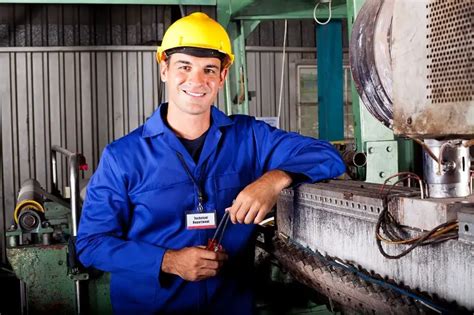Introduction

The industrial machinery mechanic is a highly skilled professional responsible for maintaining, repairing, and installing industrial machinery. This complex and demanding trade plays a vital role in ensuring the smooth operation and efficiency of various industries, from manufacturing to transportation and construction.
The Role of an Industrial Machinery Mechanic
Maintenance and Repair:
Industrial machinery mechanics are responsible for the regular maintenance and repair of industrial machinery, including:
- Mechanical components: Bearings, gears, chains, shafts
- Electrical systems: Motors, transformers, circuit breakers
- Hydraulics: Pumps, valves, cylinders
- Pneumatics: Compressors, solenoids, actuators
Installation and Commissioning:
Mechanics also play a crucial role in the installation and commissioning of new machinery. They ensure proper alignment, calibration, and testing to guarantee optimal performance and safety.
Troubleshooting and Diagnostics:
When machinery malfunctions, mechanics are responsible for diagnosing the problem and implementing appropriate repair solutions. Advanced diagnostic tools and techniques are essential for identifying and resolving complex issues.
Safety and Compliance:
Mechanics adhere to strict safety regulations and industry standards to prevent accidents and ensure compliance with environmental regulations. They regularly inspect machinery for potential hazards and implement preventative measures.
Motivations and Pain Points
Motivations for Pursuing a Career as an Industrial Machinery Mechanic:
- High demand: Skilled mechanics are in high demand in various industries.
- Job security: Industries rely heavily on machinery, ensuring job stability.
- Competitive compensation: Mechanics with specialized skills can earn substantial salaries.
- Personal satisfaction: The ability to restore and maintain complex machinery provides a sense of accomplishment.
Pain Points Faced by Industrial Machinery Mechanics:
- Physically demanding: The job requires heavy lifting, climbing, and working in confined spaces.
- Hazardous environment: Mechanics work with heavy equipment and potentially hazardous materials.
- Time constraints: Machinery breakdowns often require immediate attention, leading to time-sensitive work.
- Skill gap: The industry faces a shortage of skilled mechanics, impacting productivity and efficiency.
Strategies for Success
Education and Training:
Industrial machinery mechanics require a combination of formal education and practical training to acquire the necessary skills and knowledge. Technical schools and community colleges offer associate’s degree programs in industrial machinery repair, while apprenticeship programs provide on-the-job experience under the supervision of experienced mechanics.
Certifications and Licenses:
Industry certifications and licenses demonstrate a mechanic’s competence and credibility. Several organizations, such as the National Institute for Metalworking Skills (NIMS) and the American Welding Society (AWS), offer certifications in various aspects of industrial machinery repair.
Continuous Improvement:
The industry is constantly evolving, introducing new technologies and techniques. Mechanics must stay up-to-date with the latest developments through industry publications, seminars, and online resources.
Teamwork and Collaboration:
Mechanics often work as part of a team to tackle complex repair projects. Effective communication, problem-solving, and teamwork are essential. Collaboration with engineers and other professionals ensures efficient maintenance and repair.
Tips and Tricks for Industrial Machinery Mechanics
Preventive Maintenance:
- Establish regular maintenance schedules to identify and address potential issues before they escalate.
- Utilize condition monitoring tools (e.g., vibration analysis, thermography) to detect early signs of wear or malfunction.
Troubleshooting and Diagnosis:
- Use a systematic approach to troubleshooting, isolating the potential cause of the problem.
- Consult technical documentation and manufacturer’s guidelines to gain specific insights.
- Leverage diagnostic tools such as multimeters, oscilloscopes, and diagnostic software to pinpoint the exact issue.
Spare Parts Management:
- Maintain a well-stocked inventory of critical spare parts to minimize downtime in case of breakdowns.
- Use a parts tracking system to prevent shortages and facilitate efficient ordering.
Safety Precautions:
- Always wear appropriate personal protective equipment (PPE) when working with machinery.
- Lock out and tag out machinery before performing any repairs or maintenance.
- Follow established safety procedures and adhere to all industry regulations.
Conclusion
Industrial machinery mechanics are essential to the operation and efficiency of various industries. By understanding their role, motivations, pain points, and strategies for success, aspiring mechanics and current professionals alike can navigate the challenges and reap the rewards of this rewarding trade. As technology continues to advance and machines become more complex, the demand for skilled industrial machinery mechanics will only grow.
Additional Resources
Tables:
| Metric | Value |
|---|---|
| Average Salary for Industrial Machinery Mechanics (US) | $57,600 |
| Number of Industrial Machinery Mechanic Jobs Expected to Be Created by 2029 (US) | 35,900 |
| Percentage of Industrial Machinery Mechanics with Associate’s Degree or Higher | 75% |
| Top Industries Employing Industrial Machinery Mechanics | Manufacturing, Construction, Utilities |
Industry Associations:
- National Tooling and Machining Association (NTMA)
- Precision Machined Products Association (PMPA)
- American Society of Mechanical Engineers (ASME)
Government Agencies:
- Occupational Safety and Health Administration (OSHA)
- National Institute for Occupational Safety and Health (NIOSH)
